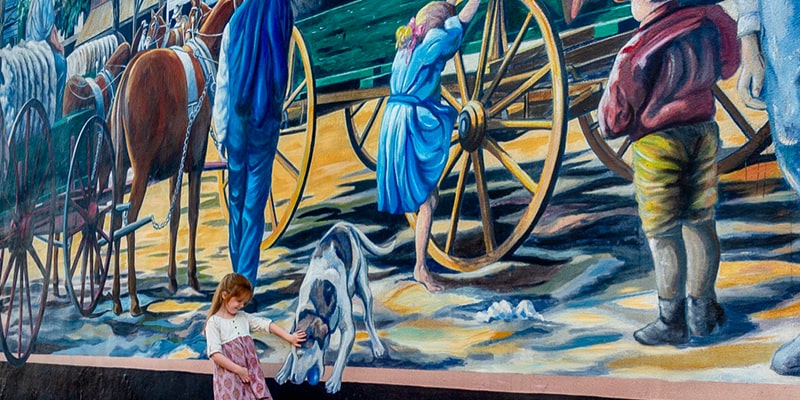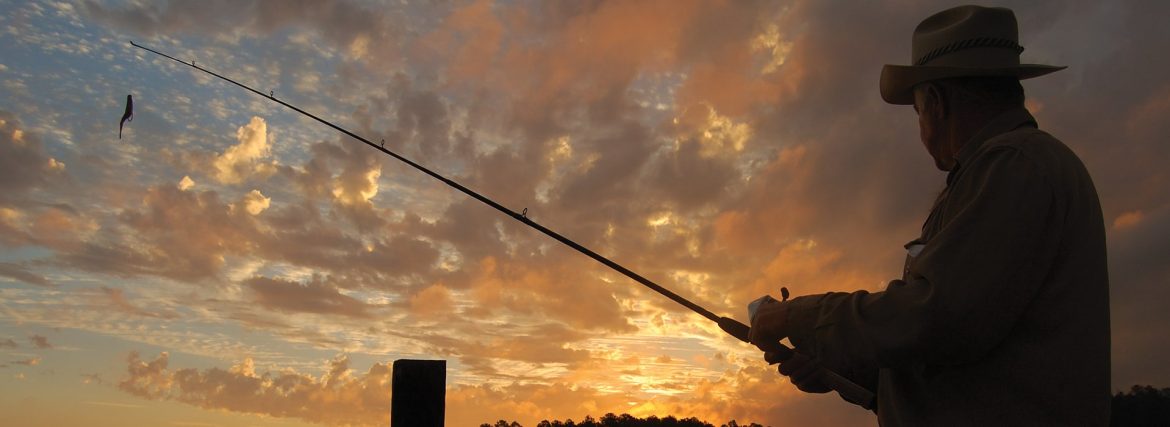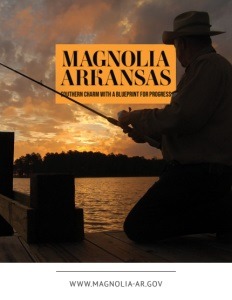Southern Charm with a Blueprint for Progress
A Historic Town Leveraging Strategic Planning and Collaboration to Build a Sustainable and Prosperous Future
Driving through Magnolia, Arkansas, the image is one of true Southern charm, with stately magnolia trees lining the courthouse lawn and a sense of historic warmth. Yet, beneath this serene surface lies a community pulsing with dynamic growth and opportunity.
Having recognized the need to modernize, Magnolia is consciously leaping from its past to position itself firmly in the future. “Whenever we started the upgrade of the new 2040 master plan, I brought it to everybody’s attention that we were just trying to get to the 20th century,” admits City Inspector David Nelson, highlighting the town’s former challenges. “They said, but it’s the 21st century and I said I know, and that’s how far behind we are.” Today, that narrative is rapidly changing as the town charges “beyond the 21st century,” as Nelson explains.
Spearheading this transformation are Community Developer Kelli Souter and Nelson himself, a collaborative duo whose approach ensures a unified vision for progress. Souter describes the community as having “true Southern charm with a lot of growth and opportunity available.”
Through a strategic 2040 Master Plan, critical infrastructure upgrades, and a proactively supportive business climate, Magnolia is creating a compelling environment for investment and residential growth, planting the seeds for a prosperous new chapter.
A Master Plan Built for Tomorrow
The catalyst for Magnolia’s current momentum is its strategic 2040 Master Plan, a comprehensive effort to modernize the city’s foundational framework. The need was clear, the city was operating on a severely outdated code.
“We were working off of a code that was 2003 when we started the new development plan,” Nelson explains. While the plan’s rollout hit a snag with COVID, the city has since made significant strides.
This new blueprint guides development across two distinct, purposeful corridors. The first is the established downtown square, which defies the trend of dying rural main streets. “We have a very established downtown, unlike a lot of other small towns in rural America where their downtown is dying,” Nelson states.
Efforts are now focused on enhancing this asset by planting trees and attracting new businesses to a few vacant buildings, bolstered by the vibrant success of anchor establishments like Lefty’s. “So what we’re trying to do moving forward is just bring back the downtown feel,” he adds.

The second focus involves strategic corridors that handle different types of growth. The Magnolia Bypass (Highways 79/82) has evolved into the city’s main commercial and logistics hub, attracting new hotel and apartment developments.
Conversely, the Jackson Street Corridor represents a targeted, mixed-use opportunity. This route directly connects Southern Arkansas University to the downtown square and is envisioned as a future zone for live-work communities and facilities, strategically linking the city’s core educational and civic assets.
Foundational Systems
Underpinning Magnolia’s growth strategy is a commitment to robust infrastructure, a critical factor for any business considering expansion. Key transportation upgrades are already complete and yielding benefits. A major ARDOT project widened Highway 82 and 79 from two lanes to five within the city and upgraded the bridge at their intersection.
This project, as Nelson confirms, “has already been completed,” and has tangibly helped with the traffic flow, enhancing logistical efficiency for existing and future businesses.
Perhaps the most significant strategic advantage, however, lies in the city’s utility capacity. While other booming regions struggle with capacity, Magnolia is ahead of the curve.
“We make way more water than we use,” Nelson states, a rare and valuable position. He emphasizes this capacity is a ready asset for industry, noting, “we are set up that we could, if a large industry that used a large amount of domestic water, we could supply them without even having to take a second look to make sure.”
Concurrently, the city is proactively making changes to its wastewater system to ensure it can equally handle and sustain future growth, turning a potential bottleneck into a core competitive strength.
The Reserve at Magnolia Lakes
Acknowledging that growth is impossible without adequate housing, Magnolia is directly confronting a significant housing deficit that has been a barrier to its expansion. “As of right now, we are in a housing deficit,” states Souter, putting a number to the historical challenge, “a couple years ago, it was about 350 houses.” With new construction not keeping pace, the need for a major development was critical.
The solution comes in the form of The Reserve at Magnolia Lakes, a transformative, 500-home project that represents the largest development of its kind in the city’s history. To facilitate this project, which lies just outside city limits, the city council approved an agreement to extend a sewer main to the site.
This proactive support underscores a commitment to overcoming obstacles for high-impact projects. Nelson explains this collaborative ethos, noting that despite the project being outside their normal jurisdiction, “I took that project under my wing and I made sure that it was constantly at the forefront of everybody’s ideas and talking about it… for the betterment of the community.”
The development itself is designed as a comprehensive, modern community. It will be a gated facility featuring two lakes, a walking trail, and various amenities. Nelson emphasizes its unique nature in the region, describing it as “truly a development where you can live and play and not have to leave the compound of the subdivision.” With the project in its final planning phases, the city anticipates groundbreaking by the end of this year or early next, marking a pivotal step in attracting and retaining a growing workforce.
A Partner for Business
Magnolia’s approach to economic development is defined by flexibility and proactive partnership rather than a one-size-fits-all incentive menu. The city consciously avoids a rigid checklist. “We do not have a checklist that says if you’ll do XYZ, we’ll provide ABC,” Nelson explains. Instead, Nelson notes that “the mayor has looked at it from you bringing any and every idea that you want to us, and we will look at them on a case by case basis and decide what we can do.”
This philosophy creates a “seamless” value proposition for potential investors. Souter affirms this commitment, stating, “we’re here for the betterment of Magnolia and we will do whatever it takes to help Magnolia be the best it can be.”
“We truly try to make sure anybody who wants to do business in Magnolia or even Columbia County, we’re going to do everything we can to make sure our end is met to get you here,” Nelson adds.
A key tool in this collaborative arsenal is the city’s portfolio of owned properties. “We have some prime locations that can be something fabulous,” Souter notes, with Nelson adding that these range “from residential to commercial to industrial,” available as land incentives for the right projects.
One key partner, Souter notes, is Southern Arkansas University which adds around 5000 people to Magnolia 9 months of the year. The university was voted #1 Best Small College in Arkansas 2 years in a row.

While a state-level incentive program may be on the 2026 ballot, Magnolia’s current strength lies in its agile, responsive, and determined local government, ready to partner with businesses to bring viable projects to life.
The New Magnolia Brand
In a deliberate move to signal its forward trajectory, Magnolia is launching a comprehensive city rebranding. The goal is to modernize its visual identity, moving beyond traditional imagery. Nelson explains the rationale, “we wanted to come up with something that didn’t scream grandma, whenever you looked at a Magnolia blossom, but it was really forward thinking, very quick, clean, crisp lines.”
The strategy involves a cohesive rollout across the city, starting with the Jackson Street overlay district and extending to new street signs and festival materials. The new logo is more than a graphic, it is a symbol of the town’s evolution.
As Nelson puts it, the fresh design “is really given a new life on the Magnolia as far as a brand.” This initiative serves as a powerful metaphor for the community itself, honoring its Southern roots while decisively positioning itself for a dynamic and contemporary future.
Quality of Life
Beyond infrastructure and housing, Magnolia’s growth is fueled by an elevated quality of life that attracts and retains talent. A prime example is the acclaimed restaurant, Lefty’s, which has become a cultural hub. Souter highlights its remarkable success, noting it now houses “The Best Overall Restaurant in Arkansas, they also have the number three hamburger, and were also voted best cocktail lounge in Arkansas.” Longstanding favorites also play a role in shaping the city’s appeal—restaurants like the Backyard Bar B Q, which has been serving Magnolia and the surrounding areas for over 35 years, offering everything from delicious BBQ and ribs to homemade pies, continue to embody the community’s flavor and tradition.
Souter explains the ultimate goal is to create a community where people “want to live local and work local.” She adds, “we want to offer people the best quality of life, a safe town to live in, something still fun for your kids, a great place where you could go to college, and then this is where you wanna raise your family.” In Magnolia, strategic development and community charm are not mutually exclusive, but are intentionally woven together.

A Vision Rooted in Reality
Magnolia’s progress is no accident, it is the result of an interconnected strategy. The 2040 Master Plan provides the direction, robust infrastructure offers the capacity, and major housing developments address a critical need, all supported by a business climate defined by collaboration. This comprehensive effort is unified by a modern new brand that reflects the town’s forward-looking ethos.
Having diligently built a solid foundation, Magnolia now stands as a strategically savvy community, fully prepared for sustainable growth and open for business, ready to write its next chapter.
AT A GLANCE
Who: Magnolia, Arkansas
What: A Southern town executing a strategic growth plan through modernized infrastructure, major housing development, and proactive business collaboration.
Where: Columbia County, Arkansas
Website: www.magnolia-ar.gov
PREFERRED VENDORS/PARTNERS
Backyard BBQ: www.backyardbbqmag.com
Backyard BBQ has been serving mouthwatering, slow-smoked barbecue for over 35 years. Known for our rich flavors, tender meats, and welcoming atmosphere, we’re a local favorite where tradition meets taste. Whether you’re craving ribs, brisket, or classic sides, Backyard BBQ delivers true comfort food straight from the pit.




